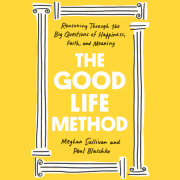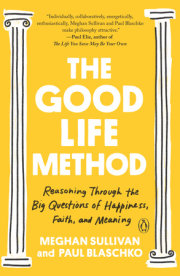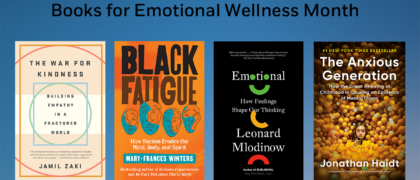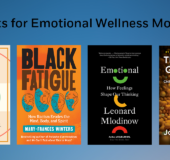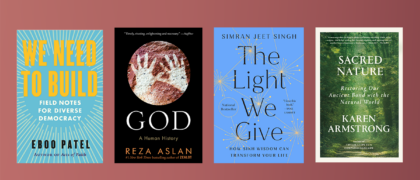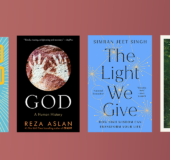1. Desire the Truth
Don't you realize what a great evil comes from dialectic as it is currently practiced? . . . When young people get their first taste of arguments, they misuse it. . . . They imitate those who've refuted them by refuting others themselves, and, like puppies, they enjoy dragging and tearing those around them with their arguments. -Plato, Republic
Decision 2016
We launched the God and the Good Life course in the fall of 2016. Two months into the inaugural semester, we thought that we were crushing it. Our in-class lectures were lively. Students wrote halfway decent essays. Our course website was crashing less often. GGL was a campus hit. But it wasn't until that November-the week of the presidential election-that we really started to understand the risks and potential rewards of what we were attempting.
The day before the general election, we invited Pete Buttigieg, then the mayor of South Bend, to help us lead a class debate about the role democracy plays in the good life. While Meghan and Pete have somewhat different political and religious outlooks, they've enjoyed the big debates since their early twenties. Pete and Meghan were in the same cohort of Rhodes scholars at Oxford in the early 2000s. Both started new jobs in South Bend in 2011. When Pete deployed to Afghanistan in 2014, Meghan lived in his house. (Paul partied there.) Pete's been dragged in as a "celebrity guest" for many of Meghan's seminars, talking about modern moral dilemmas and local government, Enlightenment philosophy and local government, Greek philosophy and local government. As they discovered, there is pretty much no subject of a philosophy course that cannot be interestingly related to problems of local government.
Paul has a more complicated relationship with Mayor Pete. From the time Paul arrived in South Bend, he has been involved in community organizing. In 2016, the mayor's office announced plans to sell its largest public park, which was the site of both the most biodiverse lake in the county and an underused municipal golf course. Paul helped spearhead an effort with activists from South Bend's Catholic Worker house to oppose the sale. He became a thorn in the side of the city government, publishing op-eds in the local paper and passionately arguing at city council meetings that maintaining the park was vital for the local community. To Pete's credit, he was willing to engage with the group, though he disagreed. Ultimately, the sale never went through.
On November 7, 2016, we brought Pete in to debate with us about Book 8 of Plato's Republic. In the chapter, Plato goes to great lengths to argue that democracy is a tragic form of government and that living in democracies will gradually destroy our souls. We thought this would be a funny class session, foregrounding the big U.S. vote. Meghan represented some of Plato's more extreme views: you can't trust the electorate; the other side is likely corrupt; people don't know what they should want; political rhetoric has absolutely no connection with the truth. Pete represented the pro-democracy side: we are more alike than we are different; we have to learn to live together; we are "political animals" who need to be civically engaged. We figured we would all have a good laugh about Plato's misguided cynicism.
Philosophy (and the professoriat more generally) skews pretty blue, and this can lead professors to off-base assumptions about our students' views. In the past few years we've heard a lot about "bubbles" and "echo chambers," but back in 2016 we were unknowingly living in one. Walking into the lecture room on November 7, we just assumed that we knew the political views of these particular students. Of course people in their demographic support Clinton over Trump. Of course they think the current American political process is unequivocally good for our souls. Mind you, we'd never asked the students directly about how their political views figure into their conceptions of the good life.
Plato versus Pete seemed to go off as planned. At the end of class we did our own Decision 2016 poll of the two hundred students in the audience, using an anonymized polling app. "Who would you vote for tomorrow?" The results were . . . surprising.
Gary Johnson 7%
Jill Stein 2%
Donald Trump 44%
Hillary Clinton 37%
Other 6%
Would Not Vote 4%
Trump won the God and the Good Life election? It seemingly defied reason. Of course, in the next twenty-four hours we'd learn that the political diversity in our class was a microcosm of our nation.
On November 9, a few hours after President-elect Trump's victory speech, we were back in the auditorium and, according to the syllabus, about to switch units and begin discussing the life of contemplation. That felt wrong. For one thing, we realized we had completely screwed up the class on the seventh. The Platonic questions-Can we trust rhetoric? Each other? Do democracies work?-were suddenly very live, very divisive issues. Protests spread across Notre Dame's normally placid campus that morning; some students were demanding the university make statements on immigration policy. Some wore MAGA hats to class; others showed up crying. It was like we went to bed Tuesday night thinking we were one unified utopian campus and woke up Wednesday realizing that we were two different cities secretly living on top of each other.
The fundamental question Plato poses is whether we can be the kind of people who both love the truth and love life together. Is there any way to reconcile the two desires in a single life? That morning after the election, we realized how much we needed Plato.
Let No One Unaware of Geometry Enter Here
Some philosophers are charismatic; you read their vision of the good life and you're immediately drawn to them. Plato is not such a philosopher. He can be judgmental and paranoid. He takes long digressions on topics like how to tame horses. It's not even always clear whether he believes what he is writing or is just being ironic. Still, if you go through Plato's training, so much else in philosophy falls into place.
In the Republic, Plato asks a great question: If we wanted to set up a city to help everyone achieve the good life, in a unified way, how would we do it? And he has a weird starting point to answer the question: geometric puzzles.
Legend has it that above the entrance to Plato's school, the Academy, there was an inscription: Let no one unaware of geometry enter here. For Plato, there is a direct connection between geometry and happiness, one with surprisingly profound implications for our current political conundrums. Caring about geometry is a warm-up for the much harder work of caring for the truth and convincing others to as well.
At some level, many of us find puzzles strangely fun. Area mazes are a very popular puzzle system in Japan; you'll find them in newspapers and books at train stations. Japanese schoolchildren work through them the way American kids do word searches. The goal in an area maze is to use just a bit of arithmetic and some logical maneuvers to figure out a mystery fact about a rectangle. The only geometry you need to remember is that the area of a rectangle is the width times the length. Here is an example of an area maze puzzle. Give it a shot.
Maybe you found the answer (if not, check the endnotes for this chapter). Now ask yourself, How does it feel to not know? And how does it feel to figure it out? And how do you feel about another person if they patiently work through it with you?
Most of us love that feeling of putting the pieces together and solving a puzzle, either by ourselves or, even better, with our friends. If you aren't a math person, think about how you feel guessing the culprit of a murder mystery or remembering that celebrity name after hours of racking your brain. There is a distinctive kind of pleasure that comes along with intellectual curiosity, achievement, and integrity. This is our rational capacity, the same part of our personality that gets frustrated when we know we need a good reason for some decision, but we can't find one good enough. This is one of those goal-seeking traits that separates us most profoundly from other animals, which, as far as we know, do not spend time devising area mazes for themselves.
Plato thought geometry puzzles have the capacity to activate the parts of our personalities that love the truth. He wanted beginners at the Academy to at least recognize they want the truth, so they might be willing to undertake the hard work of finding it. Without this recognition, Plato thought, our communities and institutions could not survive.
But as Plato knew, sometimes it can be a real struggle to be someone who perseveres in the search for the truth. This good life puzzle turns up on campuses, where we try to ask hard moral questions but sometimes fumble the necessary discussion. It also turns up profoundly in family life.
Just Asking Questions
(Paul's Apology)
A few years after the Sandy Hook Elementary School shooting, I got an email from my mom. The subject line read something like "What's going on here?!" The body of the email was just a link to a video on YouTube. It was a thirty-five-minute, extremely low production value "documentary film" that laid out the most popular arguments for the conclusion that the shooting never happened; that it was all an elaborate government hoax to promote stricter gun control laws. The arguments were frustratingly specific, and took the form of questions that are difficult to disprove without special knowledge of the events: Why doesn't the police timeline match that of first responders? Why is there helicopter footage of armed men without uniforms in the nearby woods at the time of the event? Why do the shadows in two photos taken at the school-allegedly on the day of the shooting-seem to indicate radically different times of day?
I felt a flash of anger, then disbelief that someone would care so little for the victims of an unfathomable tragedy that they could create something so vile.
Then I felt fear that my own mother was being sucked into a void of misinformation. I both wanted to engage with her and feared that if I did I was walking into a trap. Perhaps ignoring it, while it wouldn't make it go away, wouldn't actively push her further out into space. Perhaps the best thing to do in such situations is to refuse to engage.
But there was also a tiny voice in the back of my head that said, "Well. If it's so obvious that this is false, if this conspiracy theory is so stupid and ridiculous, then what are the answers? Why don't the timelines add up? How hot does jet fuel burn? How could a pathetic defector have made three perfect shots from the sixth floor of the book depository?"
And this, perhaps, was the most terrifying moment of all.
I'm embarrassed to say that I didn't respond very charitably to my mom's email. I let the fear turn into outrage. I fired something off that included a lot of CAPITALIZED WORDS. I accused her of harming the victims of the families by spreading this kind of bullshit and said that I wouldn't even stoop to the level of discussing such internet garbage. I overreacted.
And what good did that do? Well, for a while my mom stopped sending me links to any videos. But we also talked less about the world, current events, and big questions we thought were important.
Then, one day, she sent another link-this one having something vaguely to do with vaccines for newborns. I felt the rage welling up again.
But this time, instead of firing up the engines of righteous indignation, I took a breath and emailed back a question: "Why did you send that to me?" She responded that she couldn't help herself. My wife and I were expecting our first child at the time, and she was worried about the baby. What if some newborn vaccines were unsafe? What if they had irreversible and devastating effects? I took another breath. "I appreciate your concern," I said. Because I did. "It would be tragic if we unintentionally harmed our baby," I said. Because it would be. Then I took a few cautious steps back.
I asked my mom whether she thought the claims in the video were true. To my surprise, she responded with humility and quite a bit of skepticism. She said she didn't know if she could trust the people making the video, but that their skepticism of medical authority rang true to her experience. She reminded me that she'd lived through time periods during which long-standing conventional medical wisdom was later discovered to be wrong, sometimes disastrously so. We talked about how the opioid epidemic was an example of how the system could hugely fail the public. This was not direct evidence about vaccines (and I argued as much), but it helped me understand where her curiosity about the video was coming from. She also agreed with me that the video looked crazy, but here, too, she provided a broader perspective. For someone like her who was raised in a generation where eyewitness video was held up by the evening news as irrefutable evidence, the proliferation of fake video was baffling. I agreed with her that it's important to be a fierce advocate for my child. And I admitted that my growing up with YouTube gave us very different perspectives on digital realities.
A switch flipped; my mom and I were talking again. And the dangers I'd anticipated, of legitimizing garbage sources, fanning the flames of polarization, or being unable to counter the confusing and (sometimes intentionally) misleading claims in the video she'd sent me, turned out to be unfounded.
It matters here that my mom is not a "truther," a conspiracy theorist, or an anti-vaxxer. She was a reporter for a local paper before she had kids. She once uncovered a legitimate conspiracy in our small town's local government to hide the fact that they'd accidentally killed thousands of migrating monarch butterflies with a pesticide meant to poison mosquitoes.
It is also key that our relationship matters more to us than any of our more particular current philosophical views: in politics, parenting strategy, or our general levels of trust in mainstream media sources. We can disagree on the views, but we try to keep things in perspective. Indeed, one of the reasons why I want to have these conversations with my mom is because it helps us connect. I think I'd regret avoiding these conversations, because to really love someone you've got to periodically check in and try to understand where they're coming from. For us, disagreement is a way to build up the relationship we both care so much about.
Copyright © 2022 by Meghan Sullivan. All rights reserved. No part of this excerpt may be reproduced or reprinted without permission in writing from the publisher.



